 Though I never encountered Maria Callas in person, I heard Galina Vishnevskaya in recital shortly after her 1974 emigration from the Soviet Union – and I came to understand how music, words and character can wholly inhabit a human being and come out as a single expressive entity of overwhelming power and bottomless humanity.
Though I never encountered Maria Callas in person, I heard Galina Vishnevskaya in recital shortly after her 1974 emigration from the Soviet Union – and I came to understand how music, words and character can wholly inhabit a human being and come out as a single expressive entity of overwhelming power and bottomless humanity.
The city was Indianapolis, not a hotbed of Vishnevskaya fans; the recital was part of a hastily arranged series of Mstislav Rostropovich concerts that had him guest conducting the Indianapolis Symphony Orchestra. Having left behind their lives in Russia, the celebrated couple seemed to hit the American ground running – or rather playing, singing and conducting. They emigrated with almost nothing, and they needed to earn some money.
His career was assured. Hers was not.
At the time, I lived in Muncie, Indiana, where the public library was well stocked with classical recordings, especially Russian imports in those odd, generic red covers. You couldn’t explore that repertoire without encountering Vishnevskaya, who stood out immediately from her colleagues for a voice that cut through the trivia of life and the artificiality of opera like a laser. Once the recital was announced, I was absolutely going to be there. I knew I would have many chances to hear her legendary cellist husband. But opportunities to hear Vishnevskaya in something as unfiltered as a recital seemed numbered before they began.
The program was typical for her: Tchaikovsky and Mussorgsky. Yet never had I heard someone so quickly get to the highly specific heart of any given song, crystallizing whatever emotion was at hand with a perfectly etched clarity. In the earthier Mussorgsky songs, she felt the folk-dance rhythm from within. Almost nothing about her art was external. In probably half the songs, her eyes became moist.
Never, though, did she weep. Unlike Callas, Vishnevskaya didn’t inspire pathos. She was the sort of singer who could reveal herself fearlessly because she had the extraordinary inner strength to do so. And that, perhaps, is what also allowed her to generate a kind of elemental terror in Mussorgsky’s Songs and Dances of Death. Only much later, when she wrote her autobiography Galina, did the world know that she had lived through the siege of Leningrad in World War II and watched her first child die from starvation in her arms. She could sing Songs and Dances of Death because she had seen what it looked like.
Vishnevskaya was near the end of her vocal prime at that recital – and was singing for audiences that heard the singular tone of a classic Russian voice infrequently, if ever. Unlike many of her colleagues, Vishnevskaya’s voice never had obtrusive vibrato; it came out in a clean filigree line, even when singing heavier Italian repertoire, which in that recital took the form of an encore performance of “Un bel dì.”
It was no surprise that her Indianapolis audience was tiny. Though a she was a star in France (with its long history of Russian cultural exchange), she was destined to play a distant second fiddle to her husband in the U.S., where they settled decisively once he landed the music directorship of the National Symphony Orchestra in Washington, D.C.
There was one incident backstage at Carnegie Hall when, in the receiving line after one of her performances, Vishnevskaya saw an ex-Bolshoi Opera colleague who had secretly informed on her. Her anger exploded. The colleague fought back. Jessye Norman was caught in the middle. I once asked Norman if there was any truth to this story. She didn’t deny it.
My one personal encounter with Vishnevskaya was after a Washington performance of the Shostakovich Symphony No. 14, which is essentially a song cycle – one that had been written with her in mind – and is the composer’s greatest late-period work. Vishnevskaya had just sung her farewell to opera in Paris – Tatiana in Eugene Onegin – even though she was still in wonderful voice. I told her so. Why, I asked, was she retiring from opera?
“Oh, opera,” she said, looking away and sighing with mild exasperation. “All that scenery. All those costumes …”
Suddenly, she was looking right at me. “This,” she declared, holding the Shostakovich concert program, “is the real music!”


What a fine and moving tribute! Thank you.
Galina was one of my role models. I have given coipies of her autobiography and DVDs of Alexandra, to many. Her prress interview on the DVD puts to shame the “faux” questions often asked by the media catering to a perceived “dumbed down” audfience. She was the best of several worlds — exceptional talent, great beauty, great intellect, masterful social skills, loyal and supportive friend, great courage, stratetic thinker, and someone who refused to suffer fools. Would that the world had more like her!
Extremely moving.